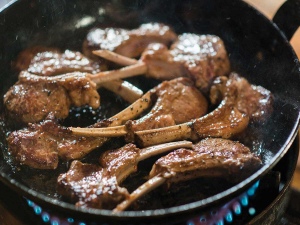NZ red meat exports surge 29% in September 2025
New Zealand red meat exports experienced a 29% increase year-on-year in September, according to the Meat Industry Association (MIA).
 Events will take place in London and Oamaru to celebrate the 140th annivesary of the first shipment of New Zealand lamb to the UK.
Events will take place in London and Oamaru to celebrate the 140th annivesary of the first shipment of New Zealand lamb to the UK.
Celebrations will be held in London and Oamaru on 24 May to mark the 140th anniversary of the first shipment of frozen New Zealand lamb arriving in the UK in 1882.
Beef + Lamb New Zealand (B+LNZ) and New Zealand Meat Board (NZMB) chair Andrew Morrison and New Zealand High Commissioner to the UK Bede Corry will speak Butchers Hall, home of the Worshipful Company of Butchers in London.
The event, which will be attended by representatives of major UK lamb customers, will feature a welcome and performance by Ngāti Rānana London Māori Club, and a New Zealand lamb barbecue.
Meanwhile, Beef + Lamb New Zealand Ltd will also mark the anniversaries with a dinner at Oamaru’s Loan and Mercantile Building.
Speakers include George Berry, former owner of Totara Estate, south of Oamaru, where the original shipment of lamb was processed before leaving Port Chalmers for London on 15 February 1882.
Berry, who with his wife Carol, owned the Totara Estate home farm for 50 years, will outline the story of the beginnings of the meat export trade, including the pioneering role of Thomas Brydone, Superintendent of the New Zealand and Australia Land Co.
Sirma Karapeeva, chief executive of the Meat Industry Association, and Nicky Hyslop, NZMB director and B+LNZ Central South Island farmer director have also been named as speakers for the Oamaru event.
Morrison says the anniversary is particularly momentous given the NZMB is also celebrating its centenary this year.
“The Meat Board was established in 1922 and while its role has evolved, the Board now oversees $2.3 billion of red meat exports to the quota markets of the European Union, United Kingdom and United States, financial reserves on behalf of the red meat sector and drives investment in industry good activities such as genetics,” says Morrison.
Sam McIvor, chief executive of B+LNZ and the NZMB, says the UK event is a great opportunity to highlight innovation and successes in the red meat sector.
New Zealand farmers are today as rightly proud of the high quality of their naturally raised lamb as their predecessors were in 1882. That first shipment was the genesis of New Zealand’s world-renowned lamb industry.
“During 2020-21, New Zealand exported over 406,000 tonnes of sheepmeat, valued at $3.86 billion, to a total of 87 countries. The sector has also made exceptional productivity gains since the 1990s. Sheep numbers have dropped but lamb export volumes have increased, and greenhouse gas emissions reduced by over 30%.”
The National Wild Goat Hunting Competition has removed 33,418 wild goats over the past three years.
New Zealand needs a new healthcare model to address rising rates of obesity in rural communities, with the current system leaving many patients unable to access effective treatment or long-term support, warn GPs.
Southland farmers are being urged to put safety first, following a spike in tip offs about risky handling of wind-damaged trees
Third-generation Ashburton dairy farmers TJ and Mark Stewart are no strangers to adapting and evolving.
When American retail giant Cosco came to audit Open Country Dairy’s new butter plant at the Waharoa site and give the green light to supply their American stores, they allowed themselves a week for the exercise.
Fonterra chair Peter McBride says the divestment of Mainland Group is their last significant asset sale and signals the end of structural changes.